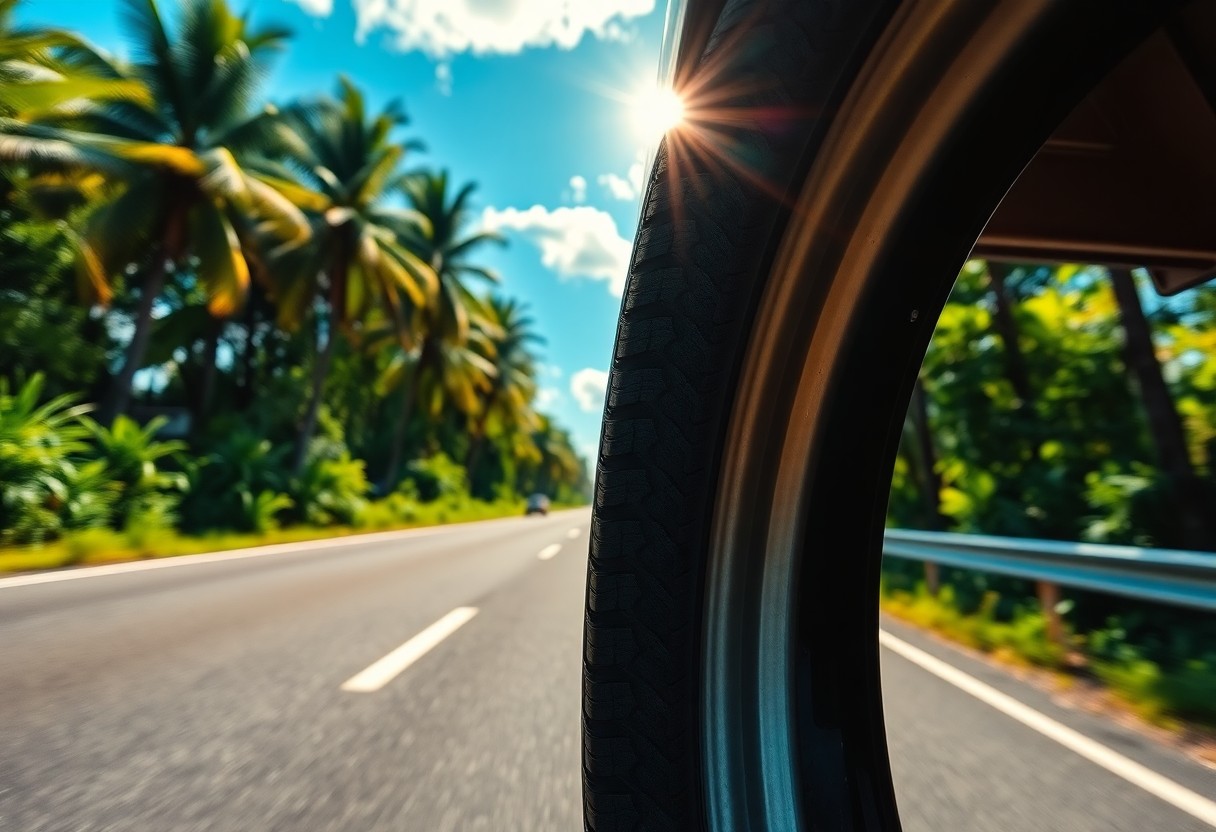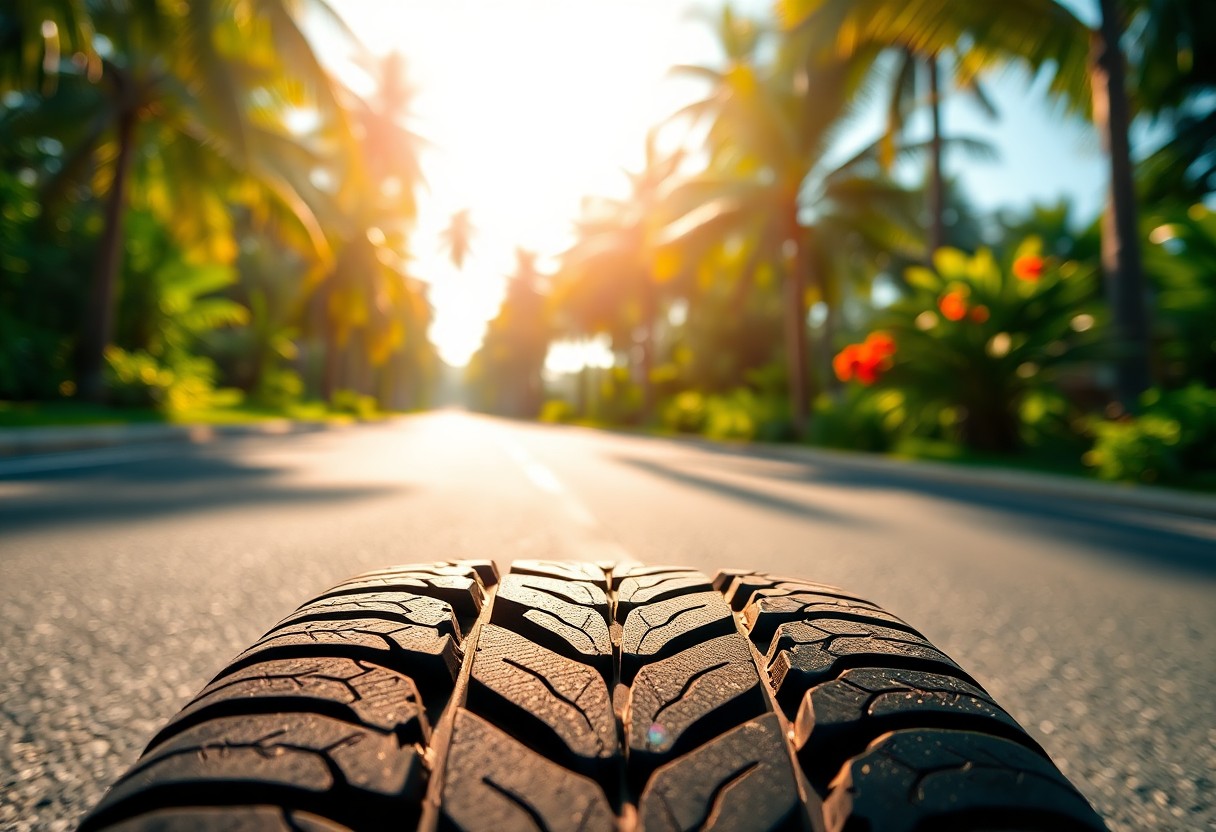Many drivers in tropical countries wonder if all-season tyres are suitable for their climate. While they offer a versatile alternative, high temperatures and heavy rainfall can affect their performance. You may benefit from improved traction in wet conditions, but potential compromises in handling could lead to safety concerns. It’s necessary to understand how your tyre choice impacts vehicle safety and performance in a tropical environment to ensure the best driving experience.

Key Takeaways:
- All-season tyres are designed for moderate climates and may not perform optimally in extreme heat found in tropical regions.
- High temperatures can accelerate wear and tear on all-season tyres, reducing their lifespan.
- All-season tyres typically have a tread pattern that may not provide sufficient grip on wet surfaces common in tropical climates.
- In heavy rain, all-season tyres may exhibit decreased hydroplaning resistance compared to dedicated wet-weather tyres.
- Drivers in tropical areas may benefit from tyres specifically engineered for hot and humid conditions.
- Regular maintenance and inspections are important to ensure all-season tyres perform adequately in tropical weather.
- Consumer reviews suggest mixed satisfaction regarding the performance of all-season tyres in tropical environments.

The Climate Challenge: Understanding Tropical Conditions
In tropical countries, you face unique weather challenges that significantly influence driving conditions. These regions often experience high humidity, intense rainfall, and elevated temperatures, leading to both fatigue and diminished vehicle performance. Understanding how these factors impact your driving environment is imperative to ensuring safety and optimal vehicle upkeep.
Characteristics of Tropical Weather
Tropical weather is characterized by high temperatures averaging between 25°C to 35°C, abundant rainfall, and an annual monsoon season. Humidity levels can exceed 80%, contributing to discomfort and heat stress while driving. You may also experience sudden storms that can lead to reduced visibility and slick road surfaces.
Impact on Road and Driving Conditions
Road conditions during tropical weather can deteriorate rapidly. Heavy rain can cause flooding, leading to ponding on roads, which increases the risk of hydroplaning. Prolonged exposure to high temperatures can degrade asphalt, resulting in potholes and pavement ruts. Your vehicle’s handling and braking performance could be compromised under these conditions, underscoring the importance of selecting appropriate tyres designed for such climates.

All-Season Tyres: A Closer Look at Their Composition
The composition of all-season tyres combines a unique blend of rubber compounds, tread patterns, and structural enhancements to create versatility. These tyres typically feature a mixture of softer and harder rubber, designed to perform across a range of temperatures while maintaining durability. The tread design is engineered to provide effective traction on both wet and dry surfaces, catering to the varied conditions that can be found in tropical climates.
Key Features of All-Season Tyres
Key features of all-season tyres contribute to their popularity among drivers looking for a balanced performance across diverse conditions.
- Versatile tread patterns designed for various road conditions
- Enhanced wet performance for improved hydroplaning resistance
- All-weather grip to maintain traction in unpredictable climates
- Durability for extended tread life
- Comfort through noise reduction technology
Any driver looking for a reliable tyre solution can benefit from these features.
Performance Metrics in Diverse Climates
Performance metrics for all-season tyres vary significantly based on climate, affecting their handling and longevity. In tropical regions, high temperatures can lead to increased wear, while heavy rainfall impacts traction and control. Tests show that all-season tyres typically maintain performance up to 45°C, but exceeding this can result in a reduction in effectiveness, particularly on wet surfaces. Ensuring proper maintenance and pressure checks can enhance their lifespan and performance, making them a suitable choice for drivers navigating tropical environments.
Performance Analysis: Do All-Season Tyres Hold Up in the Tropics?
All-season tyres may seem like a versatile choice for tropical climates, but their performance can vary significantly under extreme conditions. As temperatures soar, their design aimed at comfort may falter, leading to increased wear and reduced grip on both dry and wet surfaces. While they provide a balance between summer and winter performance, in constant heat, expect more frequent replacements due to accelerated degradation and compromised safety.
Heat Resistance and Wear Patterns
In the intense tropical heat, all-season tyres generally exhibit accelerated wear patterns compared to those designed specifically for high temperatures. The softer rubber compounds used in these tyres can struggle, leading to higher tread wear rates after just a few thousand miles. Your tyres may require more frequent inspections to ensure they remain safe and effective.
Rain and Hydroplaning Risks
Heavy tropical rain poses significant hydroplaning risks for all-season tyre users. Although these tyres are designed for wet conditions, the volume of rainfall and rapid water accumulation can overwhelm their drainage capabilities, especially with deep standing water. Slippery road surfaces increase the chances of losing traction, making it imperative to drive cautiously.
Even if you choose all-season tyres, understanding their limitations in heavy rain is crucial. With tropical storms often dumping intense amounts of water in short periods, the existing tread patterns may not sufficiently channel water away, leading to hydroplaning at speeds over 50 km/h. Upgrading to tyres specifically optimized for wet conditions could enhance your safety and control on notoriously slick roads.
Real-World Experiences: Insights from Tropical Drivers
Drivers in tropical countries often report mixed results with all-season tyres. Many appreciate the cost-effectiveness and versatility of these tyres, noting satisfactory performance during dry spells. However, experiences are more negative during heavy rainfall, where the risk of aquaplaning increases. Reports of reduced grip and handling on slick, wet roads suggest that, while they can be suitable, all-season tyres may not always meet expectations in extreme weather situations typical of the tropics.
Common User Experiences and Recommendations
Many users recommend investing in high-quality all-season tyres for tropical conditions. They often highlight the importance of regular maintenance and checking tread depth to enhance safety. While some drivers achieve general satisfaction, you should consider seasonal alternatives if you frequently encounter heavy rain or off-road conditions. Choosing recognised brands often leads to better performance and longer tyre life, impacting overall driving safety and experience.
Expert Opinions from Tyre Manufacturers
Manufacturers assert that all-season tyres can perform adequately in tropical climates but note the importance of specific tread designs that enhance water drainage and mitigate hydroplaning risks. They emphasize the need for regular inspections and emphasise that not all all-season tyres are created equal, with some models significantly outperforming others in wet conditions.
Experts from major tyre companies point out that advanced rubber compounds and innovative tread patterns can greatly influence performance in hot and humid environments. They recommend selecting tyres specifically designed with tropical conditions in mind, highlighting models that incorporate features like deep grooves for enhanced water evacuation and anti-heat technology to withstand high temperatures. Furthermore, they suggest trialing products under local conditions before making a long-term commitment, ensuring that your choice aligns with the driving habits and climates you frequently encounter.
Making an Informed Choice: When to Use All-Season Tyres in Tropical Zones
Using all-season tyres in tropical climates requires careful consideration of specific conditions. These tyres can perform adequately in warm weather, but their effectiveness diminishes during heavy rainfall or extreme heat. You should evaluate factors such as driving habits, local climate variations, and expected road conditions when determining if all-season tyres are the right fit for your vehicle. Ultimately, thorough research and awareness of your environment lead to a better decision. Thou must weigh these criteria for optimal safety and performance.
Factors to Consider Before Purchasing
Evaluating whether to invest in all-season tyres involves multiple key factors. Examine your local climate, which may include periods of intense rainfall or prolonged dry spells. Pay attention to the type of roads frequently traveled; urban versus rural driving can necessitate different tyre capabilities. Moreover, consider the performance features needed for your vehicle, especially if handling and traction are priorities. Lastly, factor in your personal driving style and how often you rely on heavy-duty performance. Thou should conduct thorough research to ensure your safety on the road.
Alternative Tyre Options for Tropical Drivers
For those in tropical zones seeking optimal performance, alternative options include summer tyres, which excel in hot conditions and provide superior grip. Off-road tyres can be valuable if you often navigate unpaved surfaces, offering enhanced durability and traction. Additionally, consider performance tyres designed for heavier rain, featuring tread patterns that channel water effectively. Each option addresses unique driving needs, helping to ensure safety and performance tailored to tropical conditions.
Summer tyres are crafted using softer rubber compounds, maximizing traction in warm temperatures, while their tread patterns prioritize water evacuation to combat hydroplaning. Off-road tyres, with their rugged designs, provide the durability necessary for challenging terrains frequently encountered in tropical areas. Performance tyres’ innovative designs focus on enhancing grip during heavy rainfall, ensuring a safer drive. Evaluating the specific terrain and climatic conditions you face allows you to select the most appropriate alternative, ultimately improving your driving experience in tropical environments. Thou must assess your options critically for the best performance on the road.
To wrap up
Upon reflecting, you may find that all-season tyres can perform adequately in tropical climates, offering a balance between comfort and versatility. However, understanding the specific demands of your driving conditions is crucial. With higher temperatures and potential heavy rainfall, opting for tyres designed for warm weather may enhance your safety and performance. Evaluating your local weather patterns and driving habits will help you make an informed decision that best suits your needs.
FAQ
Q: Do all-season tyres perform well in high temperatures?
A: Yes, all-season tyres are designed to handle a range of temperatures, including high heat, making them suitable for tropical climates.
Q: Are all-season tyres suitable for heavy rainfall in tropical regions?
A: All-season tyres have a tread pattern that provides better traction in wet conditions than summer tyres, but they may not perform as well as dedicated wet-weather tyres in heavy rainfall.
Q: How do all-season tyres wear in hot and humid environments?
A: All-season tyres tend to wear evenly in hot and humid conditions, but consistent exposure to high temperatures may lead to faster degradation compared to cooler climates.
Q: Can I use all-season tyres year-round in a tropical country?
A: Yes, all-season tyres can be used year-round in tropical countries, as they are designed to handle various weather conditions typically found in those regions.
Q: Do all-season tyres provide adequate grip on unpaved roads common in tropical areas?
A: All-season tyres can handle light off-road conditions, but for more rugged or unpaved roads, dedicated off-road tyres might be a better choice.
Q: How do all-season tyres compare to summer tyres in tropical climates?
A: All-season tyres offer more versatility than summer tyres, as they can perform adequately in both dry and wet conditions, while summer tyres may only excel in dry weather.
Q: Is there a difference in performance between budget and premium all-season tyres in warm climates?
A: Yes, premium all-season tyres typically offer better durability, grip, and performance in warm conditions compared to budget options, which may compromise on these aspects.
